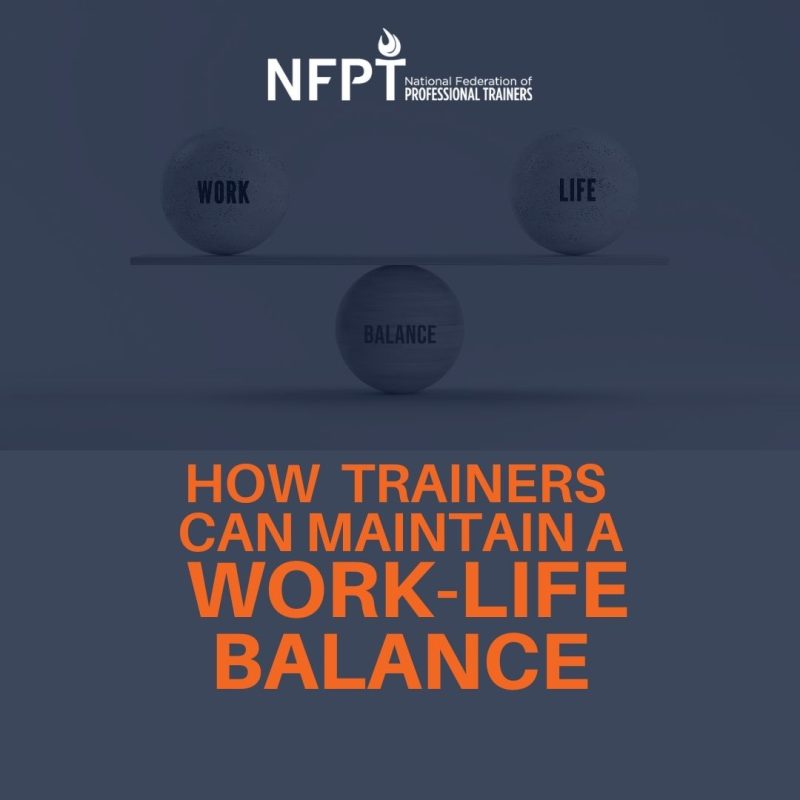
The fitness industry is renowned for its passion-driven professionals who are committed to helping others achieve their health and wellness goals. However, maintaining a healthy work-life balance can be challenging, especially for new personal trainers. In this article, we will explore effective strategies to help newcomers in the field strike a harmonious balance between their work responsibilities and personal well-being.
Understanding the Work-Life Balance Challenge
As a new professional entering the workforce, whether that be as an employee at a box gym, an independent contractor working for a small gym, starting your own business and hustling for in-home clients, you may often find yourself consumed by the demands of building a client base, managing schedules, and continuously expanding your knowledge. This (understandable) dedication can lead to neglecting personal time, relationships, and self-care. Establishing a healthy work-life balance is crucial to nurture both professional sustainability and personal well-being, and ultimately, preventing burn out in a career that you love.
Setting Boundaries
One of the first steps towards achieving work-life balance is setting clear boundaries right out of the gate. New personal training professionals should define specific work hours and allocate appropriate blocks of time for personal activities, rest, and relaxation. Communicating these boundaries to your clients, colleagues, and employers fosters understanding and respect for your personal time, ensuring a healthier balance between work and personal life. Further, it’s okay to say, “My plate is as full as I’d like it to be right now,” if you need to create space for yourself, or, “I’m sorry, that’s outside of my scheduled work hours,” if a potential client wants to schedule a time convenient for them, but not for you.
Effective Time Management
Time management skills play a vital role in maintaining work-life balance. New personal trainers should prioritize tasks, create daily or weekly schedules, and allocate time for self-care, exercise, and family or social commitments. By using productivity techniques, such as the Pomodoro Technique or time-blocking, you can optimize your efficiency and ensure dedicated time for both work and personal life.
A common mistake made by new personal trainers is scheduling clients back-to-back without allowing time for even a bathroom break in between. Rather than announcing to your next waiting client, “Give me a minute I have to run to the restroom!” schedule clients with at least a 15-minute cushion in between each. You are selling a service, not your time; manage the latter well and you will be a more effective trainer.
Self-Care and Stress Management
Self-care is crucial for managing stress and avoiding burnout. New fitness professionals should prioritize their physical and mental well-being by still engaging in regular exercise, eating nutritious meals, and getting enough sleep. What kind of coach are you if you can’t walk the walk? Additionally, incorporating stress management techniques like mindfulness, meditation, or journaling can help maintain emotional balance amidst the demands of the industry.
Seeking Support and Collaboration
No one can achieve work-life balance alone. New personal trainers should seek support and collaboration from peers, mentors, or industry networks. Engaging in communities of like-minded fitness professionals can provide guidance, advice, and valuable insights on managing work-life balance. Sharing experiences, challenges, and strategies with others can offer a sense of camaraderie and perspective, helping navigate the industry more effectively.
Flexibility and Adaptability
The fitness industry can be dynamic and unpredictable, requiring health and fitness coaches to be flexible and adaptable. Embracing change, learning to delegate or outsource tasks, and adjusting schedules when necessary can prevent feelings of overwhelm and promote a healthier work-life balance. By remaining open to new opportunities and approaches, you can find creative ways to manage your workload and personal commitments more effectively.
Achieving work-life balance is a continuous journey for new professionals in the fitness industry. By setting boundaries, practicing effective time management, prioritizing self-care, seeking support, and embracing flexibility, you can create a more sustainable and fulfilling career while nurturing your personal well-being. Striking the right balance ensures longevity, job satisfaction, and overall happiness in both professional and personal aspects of your life.







